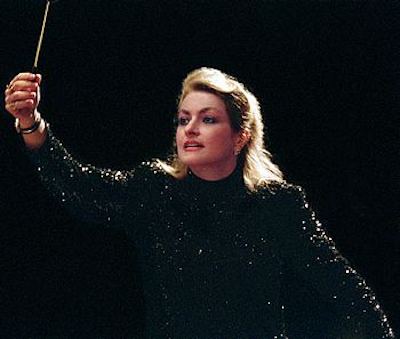Pro Arte Orchestra wraps season with a Largely Latin feast
Pro Arte Chamber Orchestra of Boston brought its season to a packed conclusion Sunday afternoon at First Baptist Church in Newton. Music director emeritus Gisele Ben-Dor returned as guest conductor. Principal oboist for the Boston Pops Esplanade Orchestra Andrew Price and principal piccolo player for the Boston Symphony Orchestra Cynthia Meyers both appeared as guest soloists. An eclectic selection of Latin American-influenced contemporary music was capped off by a cheerful Dvořák serenade.
The busy “Música de Mayo” program began with a nod to Cinco de Mayo via Mexican composer Javier Álvarez’s Metro Chabacano (1987). This brief piece for string orchestra expresses the nervous energy of a bustling train station through jittery syncopation and polyrhythms. Unfortunately, Pro Arte’s performance lacked rhythmic snap (hard enough to capture in Chabacano’s string quartet transcription let alone the original orchestral version). The insistent eighth-note pulse never entirely settled, and at times the incisive rhythms simply fell apart.
The dark hue and broader accents of Astor Piazzolla’s Oblivion created an immediate contrast in mood and execution. The Argentinian composer is best known for using his country’s tangos in classical music. Yet Oblivion is based in the slower milonga and was originally written for the 1984 film Enrico IV. Pro Arte performed Ben-Dor’s arrangement for solo oboe and lush strings which unfold Piazzolla’s wistful song.
Guest oboist Price and Pro Arte made an ideal combination in Ben-Dor’s simple but evocative setting. Price’s warm tone and long lines blended seamlessly with Pro Arte’s rich sound. The oboe’s winding, unbroken passages occasionally seemed like another string part. Price made it sound effortless yet still engaged. Pro Arte, in turn, provided a deep palette for the harmonies to shade the melody while never distracting from it. The climactic central tutti was perfectly balanced as well as touching.
The concert then took another emotional and instrumental turn with Gabriela Lena Frank’s Will-o’-the Wisp receiving its East Coast premiere. Commissioned by the Cleveland Orchestra in 2013, this tone poem/piccolo concerto sketches visions from the American composer’s childhood, as she dreamed about her mother’s native Peru. A battery of woodwinds and percussion joined Pro Arte’s strings for this piece. Starting with the static, tropical atmosphere of “Humble Song,” episodes of thunderous density and eerily spare segments trade off in the second titular movement.
Cynthia Meyers was a gripping soloist. Following the gauzy texture of harp and marimba, she entered with an intense sopranino register that never turned piercing—no small feat on this instrument. Chromatic runs and sustained tones projected through the thick instrumentation, displaying her technical ability as well as sensitivity to the composer’s soundscape.
The augmented Pro Arte orchestra deployed combinations ranging from plucked solo violin to thunderclaps of piano and lower winds over snare drum. Ben-Dor’s strong direction ensured Meyers could be heard over the orchestra’s interrogating phrases and rumbling timpani. During the following intermission, several attendees used the descriptor “magical.”
The concert brochure noted Dvořák’s Serenade for Strings in E Major as a “charming way to celebrate a Spring afternoon.” It exudes the composer’s joy as his music gained wider acceptance and he celebrated the birth of his first child alongside his newlywed wife. Abundant melodies and formal clarity mark all five movements. It also shows Dvořák’s experience as a professional violist familiar with the subtleties of string sonorities.
Starting with the gently-paced Moderato, Dvořák’s brief spotlights for each of the orchestra’s sections sprang up like miniature concertino segments in a concerto grosso. The waltzing Menuetto showcased the conductor and orchestra’s elegant phrasing—no overwhelming gestures or fussy rubato, just easygoing and uplifting flow.
Classical restraint marked the central Scherzo, which laughed with certainty rather than abandon. Dvořák’s counterpoint was played as a natural commentary in a conversation (rather than compositional mechanics). In the Larghetto, Pro Arte’s subtle dynamics showed off the composer’s gift for cantabile. Ben-Doren let the music breathe a bit more in this section, slightly elongating and subtly shaping the melodies so that the beautiful themes returned with added gravity each time.
The finale closed the Serenade and the concert with a last burst of excitement. Composer, conductor and orchestra all seemed united in a sense of play with the two-note ascent and run at the center of this movement. At one point, the motif swirled into a decelerando that threatened to fall apart before regaining balance and driving through to the end. Pro Arte ended its season with a sense of curiosity and confidence.
Pro Arte Chamber Orchestra continues its Salon Series 3 p.m. Sunday, June 9 at Scandinavian Cultural Center, West Newton. proarte.org; 617-779-0900
Posted in Performances
